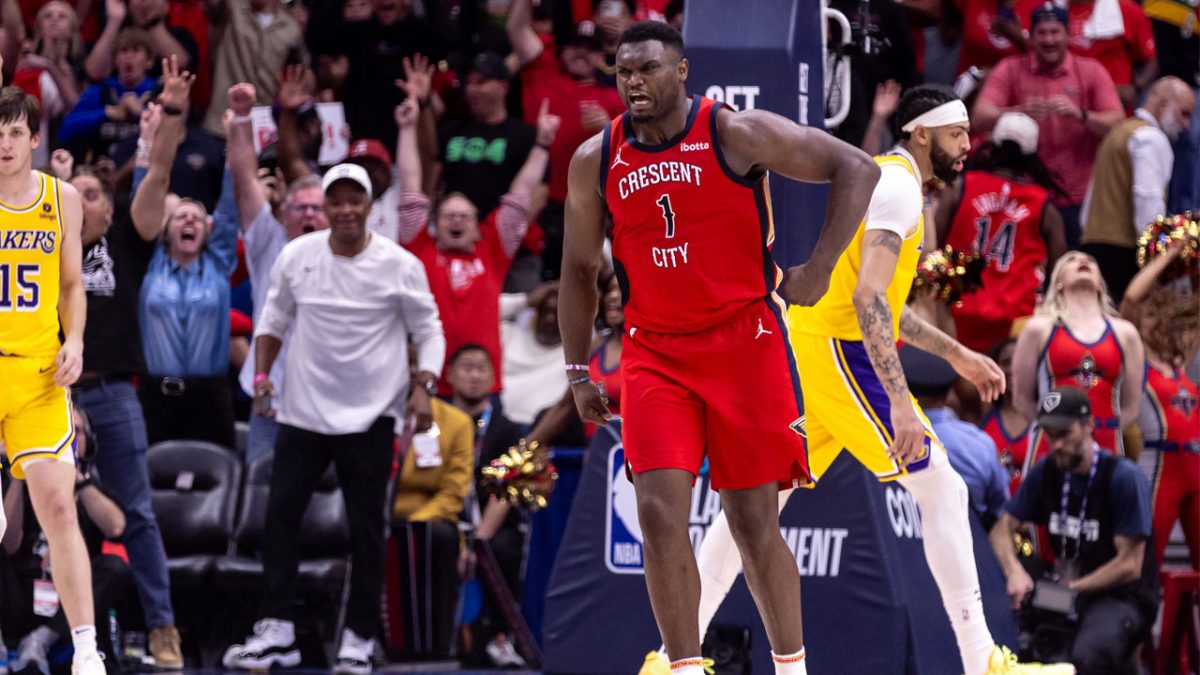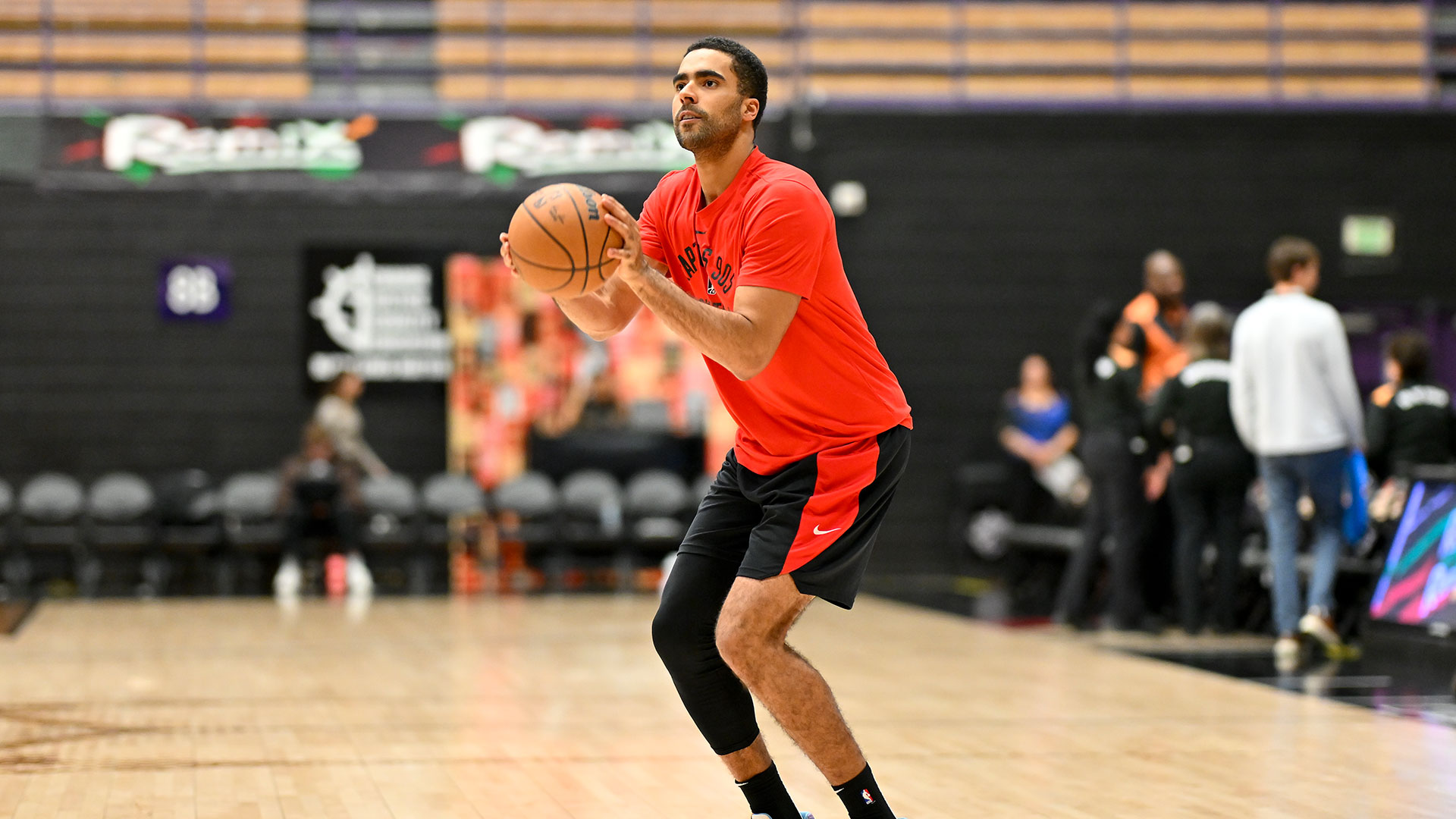Dwyane Wade was cooking, fresh after a two-game absence and his body was giving him a little extra life, so he was going to continue this hot streak shortly after re-entering in the second quarter of Friday night’s game against the Rockets.
As Cameron Payne looked to inbound the ball to Wade after a turnover, Wade pitched it back to Payne to run the show—perhaps sensing his teammate needed a confidence boost after going five minutes without touching the ball.
A few seconds later, Payne and Wade were running back on defense after a Payne turnover when the point guard jumped in the air to pass and the ball wound up in the hands of a Rocket defender.
Rajon Rondo’s usually-poked out chest and forward-looking shoulders slumped down, and Wade grimaced a bit in frustration once play stopped. Several minutes later, that one play meant nothing as the Rockets went on an amazing 33-2 run that made the game a laugher and questioned the Bulls’ appetite for making the playoffs.
“We’re doing everything we can to compete to win, at the same time we have some young guys we wanna get on the floor. It’s a balance,” Bulls coach Fred Hoiberg said. “It’s guys, we want to get them out there and see how they play then make a decision in the second half.”
The seemingly impossibly vague task was laid out when the Bulls traded Taj Gibson and Doug McDermott to Oklahoma City for Payne, Joffrey Lauvergne and Anthony Morrow.
Gibson was the third dependable nightly player on the roster along with Jimmy Butler and Wade. For a locker room that wants to make the playoffs, it was a gut punch. For the organization, it was deemed a necessary move to evaluate players like Payne, Bobby Portis and Denzel Valentine moving forward.
NBA
If one is keeping count, it makes Payne the third “point guard of the future” since Derrick Rose was traded before the draft, as Jerian Grant and Michael Carter-Williams were the first two candidates.
When Hoiberg plays every active roster player except for the banished Nikola Mirotic in the first halves of games, it seems clear the business of basketball is getting in the way of winning.
“Hell yeah it’s hard. Absolutely. I want to win,” Rajon Rondo said to CSNChicago.com recently. “That’s what we’re here to do, is win. I had one goal when I came here: that’s to win. Business or not, that’s part of it.”
As much as it could help the Bulls in theory to “know what they have” going forward, it seems like getting a playoff berth would help the future prospects as much as anything.
“When you develop a business or have a brand, you want it to win, you want it to sell. You want it to do well,” Rondo said to CSNChicago.com. “I don’t think we do it to experiment or go different from that.”
Rondo was part of a 24-win Celtics team his rookie year, with Paul Pierce, Al Jefferson and Delonte West as the three leading scorers. Guys like Kendrick Perkins and Tony Allen were on the roster, developing but not impact players.
That June, Kevin Garnett and Ray Allen were added and the next June, Boston won the NBA title. Rondo had to deal with those personalities in his second season and figure it out on the fly.
But even he can’t say whether that miserable rookie season had any bearing on how he developed the next year and beyond, whether playing losing basketball did more good compared to watching winning basketball.
“There’s no exact answer, you gotta learn through experience,” Rondo said to CSNChicago.com. “We go out there, we’re in sixth place (tied at that point in the East)…I don’t feel like…I feel like we should be trying to move up.”
Now on the outside looking into the playoff picture, it wasn’t that way after the Bulls beat the Golden State Warriors on national TV. One could say the Bulls had an inside track at staying at the sixth spot ahead of Indiana and Detroit as opposed to the free fall since.
“(We should) continue to try to move up in seeding versus experimenting,” Rondo said.
Experimenting like Carter-Williams going from barely playing at all to being thrown in early against the Rockets because of his relative success against James Harden in their first meeting.
Experimenting like Grant being subbed out for Carter-Williams at the 8:45 mark of the first quarter against the Rockets after being the only one with a pulse two nights before in the fourth quarter against the Orlando Magic.
Grant only played 12 minutes against the Rockets, so was his lack of playing time related to matchups or evaluations?
Which brings things in Hoiberg’s direction, as it doesn’t seem like he has specific directives aside from knowing he has to play the young guys so they can be evaluated.
And to be clear, even before the recent alterations to the roster, there were plenty of gripes from the locker room about the lack of consistency in terms of player rotations and accountability from the start of the season.
One wonders if players can be evaluated or grow when there’s no consistency. With this process, how are the young players learning much of anything?
“Just no consistency at all… Our team overall. It’s difficult,” Rondo said. “We are losing some games in the fourth, some games we should win…I don’t know if we’re doing analytics, what we’re doing as far as who we play, who’s not. Everybody has to be ready when their name is called.”
It seems unfair to ask Hoiberg to play virtually everybody with the intent of player evaluation, as even the worst teams aren’t stock full of unproven talent. Some players are highlighted and pressed forward, others are left behind.
Even Isaiah Thomas of the Boston Celtics was disgusted with the notion of coach Brad Stevens still tinkering too much with the rotation, this deep into the season.
But the Celtics are in a position where playoff seeding doesn’t matter as much as getting players ready for the postseason.
The Bulls don’t have that luxury, in terms of playoff positioning.
“You’re right,” Hoiberg said when presented with the notion hardly any team plays 12 players in a competitive game, leaving it to interpretation, like everything else in this Bulls season.
“I think it is a goal…for the majority of us,” said Rondo on the notion of winning. “I don’t know what the business side of it is. I’m not involved in it. We don’t know, we try to play with what we have and try to win. But the business part of it has the most control.”
Choosing his words very carefully, a notion repeated by Wade nights later, Rondo was asked if he was confused.
“It’s not confusing, it’s frustrating,” Rondo said. “I feel like I know what it is. I know what it is, but I don’t have all the answers, I may be wrong. But there’s no consistency.”
----------------------------------------------------------
Laughter is common in the Bulls locker room after games, probably more therapy than apathy considering the state of affairs. Given the last performance and result, along with this four-game losing streak that can increase to six in the next 72 hours, it’s easy to say the laughter is from players who are just happy to collect checks and are anxious to play out the string, but players didn’t get to this level by just mailing it in.
Cards, dominos, video games. You name it, this collection of players want to win.
Competition is in their blood and they’ve been wired that way since they were teenagers.
It’s not exclusive to the Bulls; You put five guys in a game and put five players in front of them, they’re gonna try to win.
But with the objective being as such, they feel pretty powerless to the inevitability of things as they seem destined for a lottery appearance they don’t want.
“Yes,” Wade said when asked if it’s hard to play 12 during a game. “But we’re players. It’s tough because guys don’t know how many minutes they’re gonna play. Mentally it’s tough. You got younger guys, it’s hard to bring them back. You stick with it. No matter who coach puts out there on the floor. He’s trying to figure it out as well.”
“Guys in the locker room are fine. Some guys don’t know when they’re gonna play, some guys don’t know how much so it could be a little challenging. Especially young guys, when you’re trying to develop mental toughness, it could be tough. It’s the hand we’re dealt and we gotta find a way to play it.”
When Wade was asked if he signed “in Chicago to play on a developmental team”, Wade wouldn’t wade into those treacherous waters that got him fined and benched a couple months ago.
“I’m not really gonna go there. I’m not getting in trouble no more. Not gonna do it man, not gonna do it,” Wade said. “I sit in a locker, I got a jersey. I don’t wear a suit. It’s not my job. My job is to play. And try to give confidence and lead along the way. We took a smack tonight. I’ll be there against Boston trying to lead my guys in the next game.”
---------------------------------------------------------
In theory, you can develop young players under the scope of white-hot NBA playoff pressure. Giving out free reign with no expectations isn’t the reality of professional basketball, nor is playing 12 guys in what should be a competitive exercise.
It’s a meritocracy, not little league where everybody gets a chance at bat.
Just doling out minutes sets a bad standard considering nobody this side of the recent vintage Philadelphia 76ers, a team that embarrassed the league with their tanking efforts—and years later, they’re no closer to contention; In fact they’re worse off than if they had played things honest and made a true effort at competing.
Bulls GM Gar Forman has said repeatedly that you don’t want to establish a losing culture by sinking all the way to the bottom like the 76ers have in the attempt to rig the lottery system.
While that’s agreeable, this way has just as many kinks when the young players are supposed to learn on the fly from the veterans but the veterans are becoming so disenchanted with the process there’s no way for the youth on the roster to progress.
And with as much growing that Hoiberg has to do in terms of his command in holding a team accountable and figuring out how to best coach at this level, the “everybody plays” mindset isn’t exactly a fertile learning ground for him, either.
It’s clear he’s struggling with this, playing the entire roster save for Mirotic in the first half when trying to figure out who’ll play in the second half of games.
He doesn’t allow himself to have any wiggle room as far as feel and at this stage of the season, the time for juggling ended long ago.


